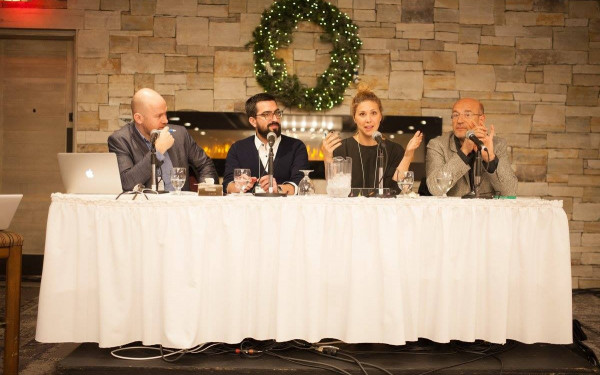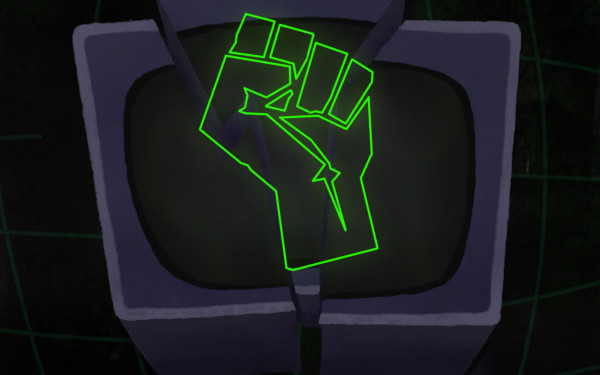Police Spying on Journalists Risks Crippling Fourth Estate
“The ‘press’ on our jacket used to be a protection—now it’s a target,” said Mohamed Fahmy, during a presentation at Concordia in September. In 2014, the former Al Jazeera English Bureau Chief was held captive for more than 400 days in Egypt’s Scorpion Prison—a victim caught between the crosshairs in a conflict zone.
Fahmy’s sentiments seemed a distant reality confined to journalists who reported from faraway authoritarian states, where democracy runs thin and the press is often stifled.
Or so we thought.
On Oct. 31, Halloween, La Presse broke a horror story of its own: for months, the Montreal Police had been spying on Patrick Lagacé, one of the newspaper’s journalists. With 24 legally obtained search warrants, the police force had the power to monitor Lagacé’s incoming and outgoing calls and track him using the GPS chip in his iPhone.
Who could have foreseen that in modern Canada today journalists would be transformed from cogs of democracy into targets of surveillance?
On Thursday, Yann Pineau, senior director of news at La Presse, spoke at McGill University, joining other journalists and media law experts as part of a panel discussion on the precarity of a free press under surveillance.
“It shook us to our foundations,” said Pineau. “We’re in journalism because we believe, somehow, there’s right and wrong. We never thought the police would go to this extent.”
For almost nine days after the news first broke, the public clamored while La Presse corresponded with Premier Couillard’s office.
“It took the election of Donald Trump to make the story go out of the news cycle,” said Pineau.
Snowden’s lecture at McGill via video link coincided with the revelations that the SPVM had La Presse Journalist Patrick Lagacé under surveillance.Are you a journalist? The police spying on you specifically to ID your sources isn't a hypothetical. This is today. https://t.co/6JtOIb7Q4n pic.twitter.com/p4pURXH4nU
— Edward Snowden (@Snowden) October 31, 2016
Today, many view the Montreal police’s actions as not just an overreach by law enforcement, but a severe attack on the role journalists play in a free and democratic society.
“Journalists are able to tell the public the truth about what happens because they have sources that trust them,” said Caroline Locher, director general of the Quebec Federation of Journalists.
Would-be whistleblowers within public institutions will now think twice about speaking out, she added.
From 2006 to 2011, Locher worked for London’s BBC World Service, reporting from countries where press freedom is an illusion.
“I never thought that what we would see here in Quebec would be very close to some of the worst dictatorships,” she said. “It very much resembles a police state.”
Fabien Gélinas, a professor at McGill’s Faculty of Law, said the hard part for legislators comes now. “Quebec alone cannot alter the law without coordinating with Ottawa,” he said, as federal parliament holds the power over changing criminal and telecommunication legislation.
“I’m very troubled by what we’ve seen, but it’s hard to make judgment without all the facts,” added Gélinas.
Until the surveillance warrants are unsealed, those facts will remain unknown. Each warrant application comes with an affidavit, said Mark Bantey, a media law lawyer, that provides a judge with enough information to decide whether to grant the warrant.
La Presse has since undertaken legal proceedings to retrieve the supporting affidavit, which Bantey believes the newspaper will eventually receive. “But it might be highly redacted,” he said. “La Presse can challenge the validity of the affidavit and the validity of the warrant.”
The question will then become whether the police in Lagacé’s case passed the basic test for obtaining search warrants, said Bantey.
“In other words, was the objective of the police really to investigate a crime or was it to discover who was leaking information to the police?” he asked. “If it was the latter, I don’t think the warrant will survive the scrutiny of the courts.”
The Montreal Police have claimed they tracked Lagacé for legitimate reasons: to probe crime within the police force itself.
Recently, the media has sought to cast blame on errant justices of the peace, representing them as civil servants without training or stature.
“The fact is that Quebec’s justices of the peace—unlike their peers in other provinces—are full members of the Quebec judiciary,” said Gélinas. “First they have a law degree, they require ten years standing at the bar, and they are appointed for life.”
According to La Presse, Josée De Carufel, the judge who granted the 24 search warrants on Lagacé, was appointed a justice of the peace after more than two decades as a lawyer.
Many critics now say the problem lies with the law itself, and that it must change to give greater protection to journalists and their sources. “Some countries are leaders in this matter,” said Locher. “In Belgium, for example, it is completely illegal to spy on a journalist unless there is an imminent terrorist threat or somebody’s life is directly in danger.
“We’re eons away from that.”
In 2010, Canada’s Supreme Court warned giving such widespread immunity to “[an] ill-defined group of writers and speakers, and whatever sources they undertake to protect, would blow a giant hole in law enforcement.”
But until journalists have some kind of accreditation system, said Gélinas, regardless of the laws in place, a person can only be identified as a journalist, case by case; after which their sources can be protected by the law.
While La Presse’s recent revelations have unsettled legal experts and galvanized the media, many in the broader public believe journalists are pushing for greater privileges for themselves.
“The argument needs to be twisted on its head,” said Locher. “It’s not about protecting journalists and giving them special privilege, it’s about the public getting information they’re allowed to have, about what’s happening in their public institutions.”
But Gélinas believes changes may be difficult to balance within the current legal framework. “The importance of confidentiality of sources is already recognized by the Supreme Court as fundamental,” he said. “But everywhere—as in Canada—it must be balanced with the other public interests at stake, including the public’s interest in law enforcement.”
Whether the Supreme Court has fairly balanced a person’s right to information with their right to law enforcement remains an interesting question, added Gélinas.
With a keyboard and an Internet connection today, any citizen can be a “journalist,” and defining who and what constitutes a journalist becomes problematic. At its core, freedom of expression means that journalists are free from government control, and that any willing citizen can share and partake in public discourse.
“The protection attaching to freedom of speech is not limited to traditional media,” said Bantey. “It is engaged by everyone who exercises their freedom of speech on the matters of public interest—including bloggers and tweeters.”

1_440_330_90.jpg)
2_440_551_90.jpg)




